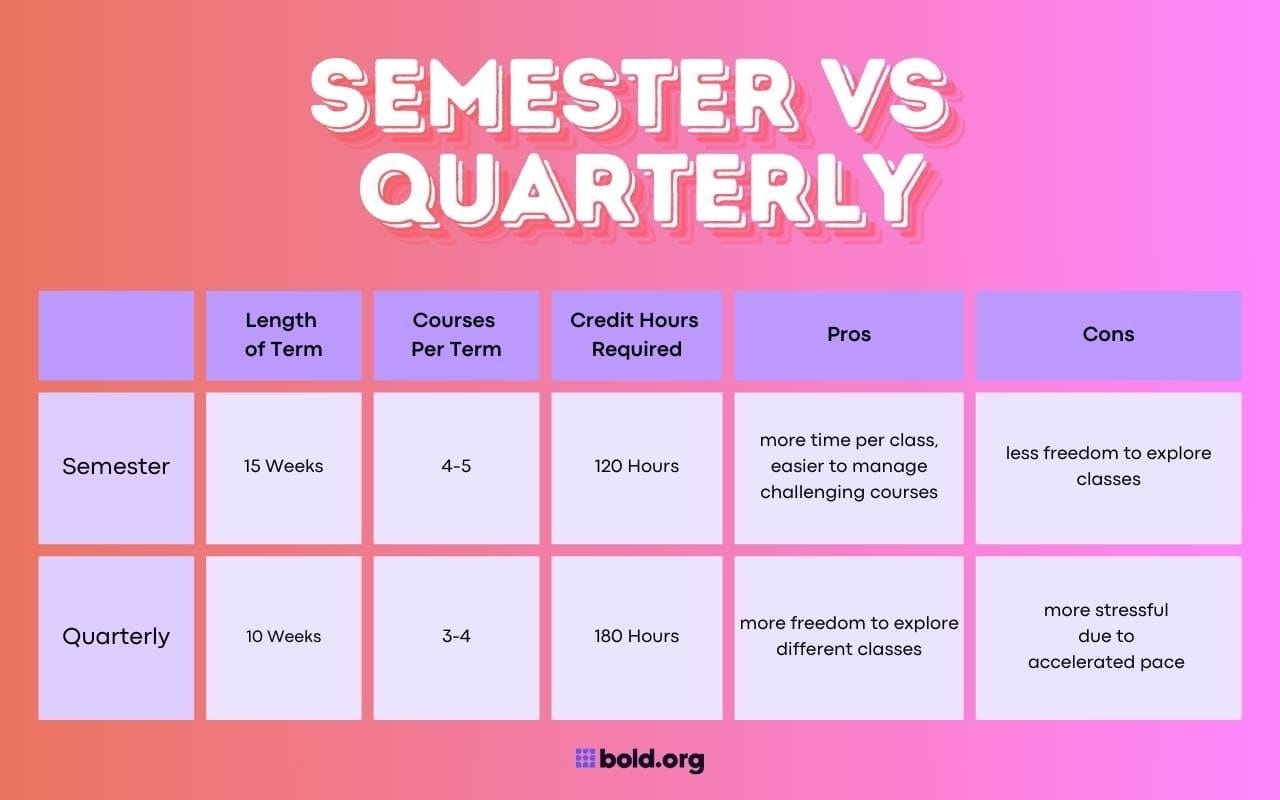How Long Is a College Semester? Your Student Guide


It might seem like a straightforward question: "how long is a college semester?" In reality, semesters in university are a bit more complicated than high school semesters which are typically standard throughout the country.
For any student getting ready to go to school, your college or university will be split into two categories: quarter or semester system. While these distinctions don't affect college material itself, they do make a difference in the speed and monthly schedule you can expect.
This article will outline the specifics of college semesters to help you prepare for this next endeavor in life! After reading, you will be able to differentiate aspects of a semester, how long a semester can be, and what college life is like.
Did you know that you can lessen the financial cost of college before even starting college? Create an account and begin saving up for your degree!

The Academic Calendar
The Concept of Semesters
In higher education and some high schools, a semester is the duration of the academic study that college classes will operate - from when the academic year begins to the last offered final. It is a period of academic study lasting for a specific length of time. Within that period of time, students may attend classes, stay on campus, engage in extracurricular activities, and take advantage of campus facilities.
No matter the college semester system, students will take 4 to 5 courses or 12-18 credit hours (depending on the institution's credit hours) to explore different career paths and gain a deeper understanding of their chosen field of study. Semesters allow students to progress through their courses in a systematic manner, building upon the knowledge gained in all the courses taken in previous semesters.
If you're already starting to feel overwhelmed by all the calendar logistics, please don't worry. There are plenty of resources to help you transition into college including our comprehensive guide on how to survive college!
Get Matched to Thousands of Scholarships
Create your Bold.org profile to access thousands of exclusive scholarships, available only on Bold.org.
Create Free ProfileLength of a College Semester: Quarter System vs Semester System
While semesters are the dominating form of operation in most educational institutions, some universities opt for a quarter system instead. The fundamental difference lies in the duration of the academic periods.

Semester System
Semesters typically last around 15-16 weeks, providing a more extended and in-depth learning experience compared to quarters.
With fewer terms throughout the year, students have longer classes that allow for more time to digest the material. While the slower pace can offer a balanced college life, semesters also require steady focus and discipline to stay on top of assignments over an extended period. This system works well for students who prefer a more structured and less rushed academic environment.
Quarter System
Quarters span approximately 10-11 weeks, offering a more accelerated learning experience compared to semesters.
There are also more quarters than there are semesters. Quarters can be intense, as students cover the same amount of material in a shorter period of time. This fast-paced environment requires students to be highly organized, focused, and efficient in their studies. It can be a challenging but rewarding experience for those who thrive in a dynamic and fast-moving academic setting.
Speaking of being highly organized, we've put together a college dorm checklist for when you need to make sure all the necessities are packed up and ready to go!

Timeline of a Typical College Semester
Although the quarter system is commonly found in public universities, this article will mainly focus our attention on the semester-based system, considering it is widely adopted and serves as a framework for many students' academic journeys. Yet, don't let that discourage you away from the quarter system, as it also has its own advantages and appeals to certain students who prefer a more condensed and rapid learning experience.
Create Your Free Profile to Apply for Scholarships Today!Fall Semester Timeline
Fall semesters are generally where students acclimate to a new year, thus leveling to an entirely new grade year. Dates usually run from August or early September, depending on the institution, to mid-December. Students return to campus after their well-deserved summer breaks, ready to embark on a new academic adventure.
A fall semester typically runs for around 15 to 16 weeks, or approximately four months. During this time, students take a variety of classes, ranging from foundational courses to more specialized ones in their chosen majors.
Every student faces the difficulty of choosing what to study in college. That's why we've written an article specifically addressing the most important factors in choosing a college degree!

Spring Semester Timeline
Similar to the fall semester, the spring semester usually lasts for about 15 to 16 weeks or roughly four months. However, this is just an average number. The duration of a college semester can vary slightly depending on the institution. Some colleges and universities may have shorter semesters, lasting around 14 weeks, while others may have longer semesters, lasting up to 18 weeks.
During this time, students continue their educational journey, building upon the knowledge gained in the previous semester and exploring new horizons. Usually, courses taken in the spring might be a continuation of the same classes from the fall.
Summer Semester Timeline
Most colleges will offer an optional summer semester during which students can catch up on academic credit, try to graduate early, or simply keep learning throughout the year. Summer semesters vary incredible but a general benchmark is 6-10 weeks with semester systems having much shorter summer semesters than quarter systems.
Summer classes are also shorter too, and more intense, similar to quarter system classes. Many universities will offer summer semesters as a way to supplement learning during the fall and spring semesters, not as a replacement for those academic periods.

Factors Influencing the Length of a Semester
Institution Policies and Regulations
The length of a college semester can vary significantly between institutions, influenced by factors like educational philosophy, accreditation requirements, and geographic location. These differences may affect the overall timeline of courses, making it important to research the specific policies and regulations of your chosen school.
Some colleges follow a traditional academic calendar with two semesters per year, while others use a trimester system with three shorter terms. Accreditation requirements also impact semester length, as institutions must meet specific guidelines to maintain their status, ensuring students receive a quality education.
Course Load and Degree Requirements
The length of a semester is largely influenced by a student’s course load and the degree requirements of their program. Some programs may require more credit hours, leading to a longer semester for those in certain fields of study. Accelerated programs can also shorten future semesters, allowing students to graduate early by taking a more intensive approach.
Institutions often offer flexible options, such as summer or winter sessions, allowing students to fulfill course requirements outside the regular semester. This flexibility helps students tailor their academic journey and potentially graduate in a time frame that fits their personal and educational goals.
You know what else can be tailored to fit your personal and educational goals? Scholarships! With our innovative scholarship search engine, you can find scholarships tailored to your major, year, or state!

Semester Breaks and Holidays
Although academic rigor is undoubtedly an integral part of college life, semester breaks bring much-needed rest to students, allowing them to recharge and rejuvenate. Two significant breaks that bookend the academic year are the winter break and the summer break.
Winter Break
The winter break begins sometime in December, providing students with a few weeks off to celebrate the holiday season with their loved ones. This usually constitutes the end of the fall semester, where you should receive the grades for all the classes taken.
Summer Break
Similarly, the summer break spans the months of May, June, and July, giving students ample time to pursue internships, engage in summer courses, or simply enjoy some well-deserved leisure. The greater your progress in your collegiate career, the more you will prepare for opportunities to take advantage of in the summer.
Holidays
In addition to these longer breaks, students also get to take breaks throughout the semester during recognized holidays. These don't impact the length of a semester. Here are some nationally recognized holidays:
- Labor Day (Sep 2)
- Thanksgiving (last Thurs of Nov)
- Martin Luther King Jr. Day (third Mon of Jan)
Unlike summer or winter break, students may continue to stay on campus. Aside from Thanksgiving and spring break, these breaks littered across the academic calendar are roughly only a couple of days long. Despite being shorter, you can use the time off to get done whatever it is you need to do, even if that means more sleep.
Want more information on spring break? Hop on over to our comprehensive guide to when is spring break!

The Impact of Semester Length on Student Life
Academic Performance and Semester Length
The length of a college semester can significantly impact academic performance. Shorter semesters create a fast-paced environment, requiring efficient time management and balancing of workload, which can be both exhilarating and challenging. Longer semesters, on the other hand, allow for more in-depth exploration of subjects and a more relaxed schedule, giving students time to fully grasp complex topics and engage in activities outside of academics.
Adapting study habits and time management to fit the specific semester length is crucial for academic success. By understanding which system suits you best, you can optimize your learning experience and achieve your academic goals.
If you're worried about your academic performance, you might want to check out our guide on what happens if you fail a class in college. It's not the end of the world so long as you're prepared.
Balancing Social Life and Academics
The length of a college semester also impacts the social aspect of student life. Longer semesters give more time for students to engage in extracurricular activities, join clubs and organizations, and actively participate in campus life.
Regardless of the semester-length, it is crucial for students to strike a healthy balance between their social life and academic responsibilities, ensuring a well-rounded college experience. It is important to not only excel academically but also nurture your personal growth and well-being. The best way to do that is to be intentional and join organizations on campus that are reflective of you.

Frequently Asked Questions About College Semesters
How many semesters until you graduate?
It truly depends on the program and school. For most people, it typically takes four years to complete undergraduate study at any university - 8 semesters in total. However, if you are taking an accelerated program, you may be able to graduate early and complete your studies in six or seven semesters.
How many credit hours are considered full-time in a semester?
Full-time enrollment is generally around 12 to 15 credit hours per semester, but this can vary among colleges and degree programs. Most courses are assigned credit hours between 1 and 6. Once you know the correct number of hours, it might help you figure out how many college classes to take a semester.
Can I change my major between semesters?
It depends on where you are in your studies. If you are in your earlier years of college, then yes, you can, of course, change your major between semesters. When you realize that you actually don't like the field of study you chose, then it might be beneficial for you to change it.
Speak to your advisor and dean to see what can be done to have that changed urgently. However, please note that after the first two years of college, it becomes incredibly difficult to switch paths without deferring graduation.
Interested to learn more about college? Maybe you want to know what to do after college or how to manage finances with student credit cards. Access all the crucial information on Scholarship Blog today.